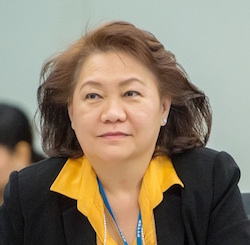Thai companies are upping their IR game, despite political instability and economic uncertainty
A military coup d’état following months of unrest. A former tycoon turned prime minister in exile following a corruption conviction after the previous coup. An emerging market during a tough time for emerging markets. Out of this turmoil last year emerged some of the top performers in our latest Asian IR research. How did they do it?

Nuchanong Sangkeaw, PTTEP
Thai companies won two top prizes at the IR Magazine Awards – South East Asia in December 2014 for the first time since the awards’ inception: best IR by a CFO for Penchun Jarikasem from PTT Exploration and Production (PTTEP), and best IR by a CEO for Banthoon Lamsam from Kasikornbank (KBank). Those two, along with hotels operator Minor International, also appeared on other key award short lists for the first time. So was there a sudden improvement in Thai IR? The consensus is no: these companies were stars already and a dark backdrop simply made them shine all the brighter.
‘Political changes in 2014 raised a lot of questions from foreign investors,’ says an analyst of 25 years’ experience in the country, speaking anonymously as a matter of policy. While staying clear of taking sides in the political debate, Thai IROs gave investors a good reading of the economy, their business and their strategy. ‘They didn’t just go blank in the face of the crisis. They responded appropriately – and well,’ he says.
Even before the coup, foreigners had been sellers of Thai stocks since the economy dipped and government protests began in 2013, yet the market kept rallying all the way through 2014. ‘That left a lot of foreign investors scratching their heads and talking more to IROs to find out what was going on. There was simply a lot more interaction,’ the analyst says.
Suwat Sinsadok, an energy and petrochemical analyst at CIMB Securities in Thailand, agrees there was a significant jump in the number of meetings between companies and investors in 2014. Suwat took companies on 15 to 20 non-deal roadshows, around double the number he did in 2013.
| IR Evolution ‘The glue holding it all together has been the stock exchange,’ says Richard Jones, head of IR and corporate communications for Indorama Ventures. Thailand, Singapore and Malaysia all have professional IR associations initially set up by their exchanges. The Thai Investor Relations Club was first established in 2001. The Stock Exchange of Thailand (SET) still gives financial support to the Thai IR Club, though its activities are separate from SET’s own good governance development and alliance department. PTT Exploration and Production’s Nuchanong Sangkeaw is a keen supporter of the Thai IR Club, including co-ordinating a recent workshop on how to create an IR program. ‘We are improving,’ she says of the whole IR community. ‘As we increase exposure to foreign investors, we understand the environment better and, as dynamic as it is, we are evolving and improving our activities. IROs know better who their investors are, what they want, and how we can best respond.’ While non-domestic investors account for only around 20 percent of SET turnover, they’re seen as a critical component in the free float of many companies, and IR strategy is typically oriented toward them. SET found in a survey last year that 90 percent of companies with more than THB50 bn ($1.5 bn) in market cap go on overseas roadshows. SET itself is a major instigator of IR events, including a constant stream of international roadshows for Thai companies. It also organizes what are known as ‘inbound roadshows’, where foreign investors come to Thailand, with investor conferences such as Thailand Focus. The most recent Thai Corporate Day event in January attracted 220 institutional investors, including 68 non-domestic ones. SET also has a thriving training program for IROs that rivals any found in the West, from basic education through intermediate and advanced education, and it developed an IR handbook and an IR code of conduct. |
Thailand’s skill in getting through tough times was hard earned. The country was ground zero for the Asian financial crisis beginning in 1997 and a lot of soul-searching followed. ‘We went through a very deep cycle in the 1990s with the Asian currency crisis, but it taught us a lot about how to behave and what to do,’ says Dr Adit Laixuthai, chief IRO and corporate secretary at KBank. ‘We learned the hard way what risk is all about, and we learned risk management. In terms of IR, when there are no clear answers, it’s our duty to explain different scenarios.’
After the 1990s crisis, Thailand embraced a new corporate governance-oriented culture encompassing strong boards, shareholder rights and transparency. As one analyst puts it: ‘The governance environment has been a strong tailwind for the IR effort.’
Today the buzz has moved on to sustainability – and not just focusing on environmental risk, but also on social and governance factors. ‘Whatever we do today, it’s not for the short term,’ Adit says. ‘We want to make sure we build integrity and trust and continue to do so well into the future.’
KBank’s ‘duty’ to its shareowners extends naturally to explaining macroeconomic and political risks, including how last May’s coup affected the country’s overall business environment. Besides, KBank under Banthoon has the reputation of being blunt and transparent. ‘We know the market can take bad news; it just doesn’t like uncertainties,’ Adit says.
The world according to CNN

Penshun Jarikasem, PTTEP
Locals were very frustrated by the sensational coverage of Thailand’s 2014 coup. ‘The perception the foreign media create is vastly different from the reality,’ says the unnamed sell-side analyst.
‘Most Thai people somehow know how to adjust to such situations,’ says Suraphon Buphakosum from the good governance development and alliance department at the Stock Exchange of Thailand. ‘But they have to spend more time explaining the political and economic outlook as well as how their firms have been preparing for the worst, if it happens.’
Richard Jones, a pioneering Thai IRO formerly at ThaiBev and now heading IR and corporate communications for Indorama Ventures, tells foreign investors: ‘Stop listening to the rubbish on CNN. Call me and I’ll tell you straight: the stock market isn’t moved by coups. It’s moved by real economics, and even the army wants people to make money.’
While many analysts and investors were naturally bearish about the military takeover, assuming there would be a caretaker government and the economy would stall, the army turned out to be reform-minded and pressed ahead with major infrastructure projects that had long been put off, as well as tax reform to address Thailand’s rather large wealth gap.
Nuchanong Sangkeaw, IR manager at PTTEP, a runner-up for the best IRO award in South East Asia, attributes the acclaim her company got in the awards survey to its timely response to investor concerns. ‘Investors weren’t coming to Thailand so we went on the road to explain what was really going on,’ she says. ‘We had a clear message: Thailand’s political instability was not hitting us, business-wise.’
PTTEP also has low oil prices to address. ‘It’s a tough time for IR and the analysts,’ Nuchanong adds. ‘Again, it comes down to the timing of our response and the clarity of our strategy in coping with this low oil-price environment.’
As one of five publicly listed units of PTT – an energy giant two-thirds owned by the government and the country’s biggest company by market cap – PTTEP has been much in the spotlight over the last year as it expanded its output across more than 40 projects spanning the globe. In April 2014 it bought out Hess Corporation’s Thai interests for around $1 bn cash.
The whole PTT group handled 2014’s political instability well, with energy demand in Thailand staying strong. PTTEP and its sister companies have been reviewing and prioritizing capex plans while saving costs and looking for M&A opportunities. PTTEP’s IR team also benefits from co-operation with the other listed companies in the PTT group. ‘We have the whole supply chain, so something that affects one firm affects the others. We collaborate on messages going to the public, and this year we’ll do roadshows together in addition to PTT Day,’ Nuchanong says.
Community improvement
Suwat, who covers Indonesian, Thai, Malaysian and Vietnamese companies, says Thai companies have by far the best disclosure in the region. Plus they’re more active in IR, with conference calls and analyst briefings around earnings and key events. The other strong area for Thai companies is their active seeking of feedback from investors and analysts, which they use to improve their disclosure and activities.
PTTEP is a good example of that kind of improvement. Since Nuchanong joined five years ago, PTTEP’s IR team has doubled from three people to six. The firm’s award-winning CFO was formerly executive vice president of corporate finance at PTT, involved in the energy giant’s landmark 2001 IPO, so is a strong proponent of IR. And PTTEP exceeds western practices, sending analysts a summary of its quarterly conference call, including the Q&A, within a few hours.
Thai companies are also said to be good at giving investors access to a broad range of management. For example, Suwat says, Indorama, Thaioil Group and PTTEP all arrange meetings with engineers when he needs a deep dive into a certain technology, and they sometimes hold ‘knowledge sharing’ sessions for groups of analysts in conjunction with results briefings. ‘Thai corporates have improved, realizing that access beyond management and IR is important,’ he adds.
Jones says IROs at large-cap Thai firms are among the best in the world: respected, fluent in English, professional and often innovative. Many stay in their posts for a decade or more, as at KBank and Siam Cement. Honest straight-talk is common, with Khalid Hashim, managing director of 2011 IR Magazine Award-winner Precious Shipping, held up as the model.
‘Thais are very sincere,’ Jones concludes. ‘It’s not that they can’t say something untrue, but they don’t want to. They’re not as sardonic and worn down as those in the West. The IR profession feels fresh and IROs still think it’s an exciting game.’
|
Q&A with Penchun Jarikasem, winner of Best IR by a CFO in South East Asia |










